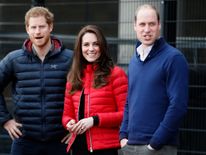Most of us won’t be healthy enough to cut a rug into our 90s. But some people are not only dancing, but cooking, driving, and volunteering at an age when they’re supposed to be feeble, addled by dementia, or both. Researchers, with an eye to an ever-aging population, are trying to figure out why.
Scientists are studying “super agers” -- 90-somethings who are living without significant physical or memory problems -- to zero in on the kinds of healthy habits that may keep us all living longer and better.
With life expectancy on the rise -- the 85-plus population in the U.S. is expected to triple to 14.6 million by 2040 -- researchers want to figure out how we can increase our health span, or the amount of time we’ll live in good health.
“The number of people living after age 90 is going to be huge. We need to know very fast how we can help these people to live very healthy,” says Oscar Lopez, MD, director of the Alzheimer’s Disease Research Center at the University of Pittsburgh.
Some people win the genetic lottery and will naturally live better longer. But experts say our genes only account for about 20%-30% of our longevity. That means we can affect the majority of our aging -- about 70%-80% -- through lifestyle.
So exactly which habits matter the most?
While there’s no blueprint, studies can offer some clues. It’s no surprise that eating healthy and exercise are likely to have a role in how well we age. But they are far from the only things involved, and they may not even be the most important ones.
Here is what researchers have found.
Lessons From the 'Blue Zones'
Author Dan Buettner has researched people who live to be 100+ since 2000. He worked with National Geographic to identify five “Blue Zones” that have the highest percentage of the world’s longest-lived people. People in these zones also lived relatively free of diseases common to aging, such as heart disease, diabetes, and cancer.
The U.S. has only one Blue Zone: the Seventh-day Adventist community of Loma Linda, CA. Other communities include Ikaria, Greece; Sardinia, Italy; Okinawa, Japan; and Nicoya, Costa Rica.
Here’s what they had in common:
- A plant-based diet -- beans, whole grains, veggies
- Opportunities for natural movement, like walking, herding, and gardening
- Having a sense of purpose
- Belonging to a faith-based community
- Taking a daily nap or finding some other way to “downshift” daily
- Not overeating and not eating after sunset
Buettner lectures widely about the importance of food, movement, prayer, and purpose -- and has spun off his findings into several books and the Blue Zones Project. Because few people in the U.S. are going to adopt herding anytime soon, the project, adopted first in 2009 by a Minnesota town, aims to find ways to make communities healthier.
About 40 communities worldwide have since adopted its principles, transforming public spaces -- parks, schools, grocery stores, and restaurants -- to encourage healthy eating and more social interaction. Some are creating new bike and walking paths . Schools may prohibit students from eating anywhere but in the cafeteria. And no-smoking policies are making it harder to light up.
“We want to give healthy options so it’s not forced on them, to make the healthy choice the easy choice. That leads to longevity and social connectedness,” says Sam Skemp, a Blue Zones Project manager with the Minneapolis-based organization. Skemp says they can measure progress through reduced obesity and smoking rates, how much produce people eat, and how much time they spend exercising.
Keeping Your Brain Sharp
A plant-based diet and exercise may stave off disease to keep us physically healthy. Can they also keep us mentally healthy? The single biggest cause of Alzheimer’s disease is aging, and rates of dementia rise sharply ages 85 and up.
When it comes to memory and thinking, studies suggest that exercise is one of the best ways to keep our minds sharp. Lopez and colleagues at the University of Pittsburgh’s Alzheimer’s Disease Research Center found that exercise builds brain cells.
“We have seen that people who walk more than 72 blocks per week had better brain volumes, and if you follow these people over time, the risk of dementia decreases. It’s relatively cheap, and it helps for general health and cognitive health,” he says. Plus, people often walk with others and may have lunch that includes a glass of wine. If they order fish, all the better for boosting gray matter, Lopez says.
Alzheimer’s researcher Claudia Kawas, MD, and her colleagues at the University of California, Irvine, are looking at how lifestyle -- exercise and diet, among them -- affects brainhealth among the “oldest old.”
Her research team has found a connection between a healthy heartand a lower chance of having dementia. Their subjects also had at least one thing in common with the folks in the five Blue Zones: They attended religious services each week. They also:
- Drank at least 1-2 cups of coffee daily
- Had a reading habit
- Took part in physical and nonphysical leisure activities
- Had an alcoholic drink or two each day
Kawas says the connection between lifestyle and brain health may not be so direct. For example, the socializing that goes along with an afternoon martini may be more important to mental alertness than the vodka you’re drinking.
She says researchers are also trying to sort out why some people who have genes that raise the odds of having Alzheimer’s don’t develop the disease. Other people have plaques and tangles in their brains often found with the disease yet have no problems with memory.
Kawas suggests a healthy diet and physical activity may create “resilience” in people who might have the genetic potential to develop Alzheimer’s, but don’t.
But diet is hard to study, she says. Of all the factors, education seems to be the strongest one for maintaining brain health, says Kawas.
“The higher your education level, the likelier you are to maintain normal cognition in the face of Alzheimer’s disease pathology,” says Kawas, a neurobiology professor at UCI’s School of Medicine. “That’s an environmental thing. Diet and exercise could be one of them, but they’re not the whole story.”
Nature vs. Environment
Some people are genetically predisposed to age later, no matter what or how much they eat.
Sofiya Milman, MD, is part of a research team at the Albert Einstein College of Medicine in New York that has been studying 90- and 100-year olds. They are all Ashkenazi Jews, descended from Eastern European Jews, and their children. The Longevity Genes Project, which started with 500 participants ages 95 to 112, found a strong connection between long life and protective genes.
Even with lifestyle taken into account, their genes outweighed bad habits. The centenarians in the study didn’t watch their weight or their diet.
“There were very few vegetarians in the group or people who avoided salt or meat throughout their lives,” she says. The study has branched into another that is following people in their mid-60s who have a parent at least 100 years old. Researchers want to see how well the children with 100-year-old parents age vs. people with non-centenarian parents. So far, they are aging well, Milman says.
“They have less heart disease, less cognitive decline, less Alzheimer’s disease,” she says. “We anticipate they will live much longer also.”
Milman, an endocrinologist, says the research shows that the people with longevity in their family have protective genes that keep old-age illnesses -- heart disease, osteoporosis, cancer, diabetes -- at bay for 20 to 30 years longer than the average person.
“If you have protective genes, perhaps they will protect you from negative effects of the environment,” Milman says. “But most of us don’t have those protective genes, so it’s important to exercise.”
Life expectancy has risen nearly 30 years over the last century, Kawas points out, led by medical and technological advances, even basic ones like good sewage and water treatment systems. An 80-year-old today has less of a chance of developing Alzheimer’s than one did 30 years ago. Because doctors understand how to manage high blood pressure, the risk of stroke has also declined, Kawas says.
Yet, whatever insights science and sociology have provided about longevity, nobody owns the recipe for putting off mortality a bit longer.
What is Kawas’ advice for pushing the mortality envelope? The evidence shows that eating a plant-based diet and staying on your feetare important, she says. But so are engaging in activities that keep the mind sharp.
“Do what your mother told you to do: Get exercise, use your brain, limit stress, get rest, and be nice to people.”








